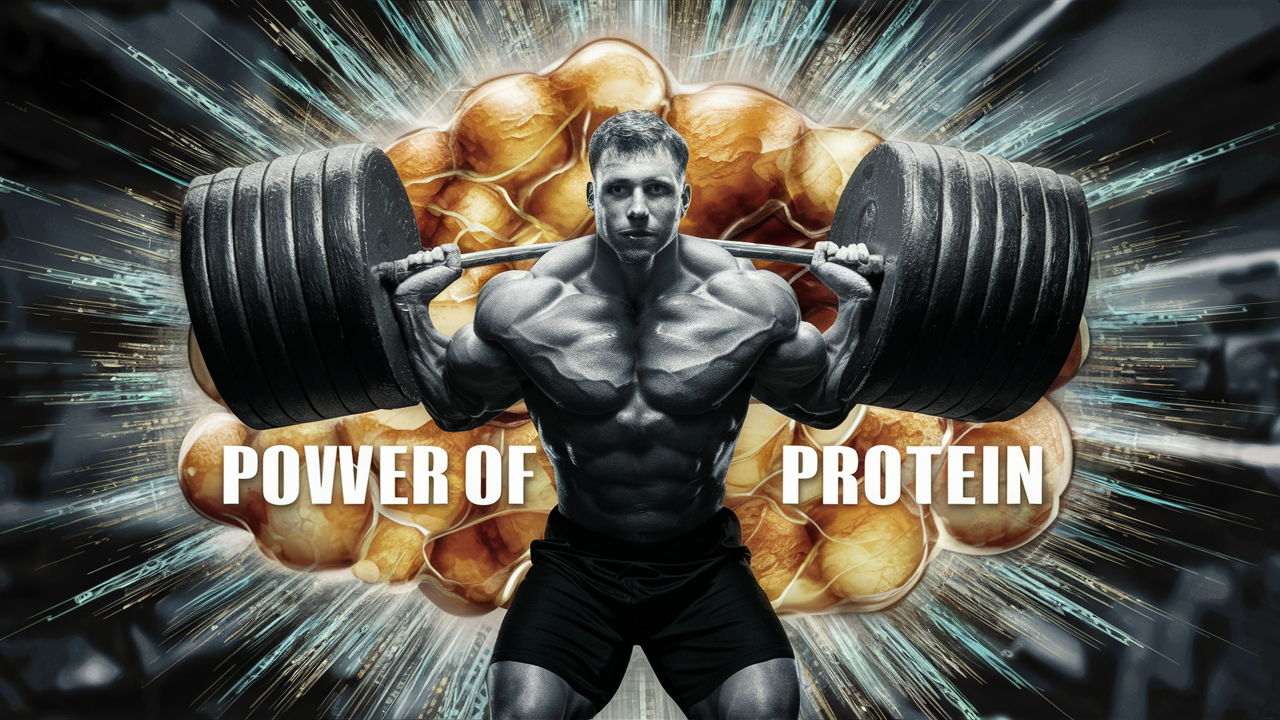
Table of Contents
The Power of Protein for Weight Management In the world of fitness and nutrition, protein reigns supreme. From protein shakes marketed for muscle gain to protein-rich snacks touted for weight loss, it’s clear this macronutrient holds a significant place. But what exactly is protein, and why is it so crucial for our health, especially when it comes to weight management and muscle building? This blog post delves into the science behind protein, exploring its role in our bodies and how it can be leveraged for your fitness goals.
Understanding Protein: The Building Blocks of Life
Protein is a complex molecule composed of amino acids, often referred to as the building blocks of life. Our bodies rely on protein for a vast array of functions, including:
- Building and Repairing Tissues: Protein is essential for building and repairing muscles, bones, skin, and other body tissues.
- Enzyme Production: Enzymes, which are vital for various chemical reactions in the body, are often composed of protein.
- Hormone Regulation: Many hormones, such as insulin and glucagon, are protein-based and play a crucial role in metabolism and blood sugar control.
- Immune System Function: Antibodies, the body’s defense system against pathogens, are made from protein.
Protein and Weight Management: A Friend or Foe?
For those seeking to manage their weight, protein can be a powerful ally. Here’s how:
- Increased Satiety: Protein is known to be more satiating than carbohydrates or fat [1]. This means it keeps you feeling fuller for longer, potentially reducing overall calorie intake and aiding in weight loss efforts.
- Enhanced Metabolism: Digesting and processing protein requires more energy than digesting carbohydrates or fat, leading to a slight increase in metabolic rate, which can contribute to burning more calories throughout the day [2].
- Muscle Preservation: During weight loss, there’s a risk of losing muscle mass along with fat. Protein helps preserve muscle tissue, which is essential for maintaining a healthy metabolism and overall body composition.
How Much Protein Do You Need?
The recommended daily protein intake (RDI) for adults is 0.8 grams per kilogram of body weight (0.36 grams per pound). However, this is a baseline recommendation. For individuals focused on weight management and muscle building, higher protein intakes may be beneficial. The optimal protein intake for these goals can vary depending on factors like:
- Activity Level: Athletes and individuals engaging in regular exercise typically require more protein than those with sedentary lifestyles.
- Age: As we age, muscle mass naturally declines. Consuming adequate protein can help mitigate this decline and support muscle health.
- Weight Loss Goals: When aiming for weight loss, including a higher protein intake (1.2-1.6 grams per kilogram of body weight) can help preserve muscle mass and support satiety.
Muscle Building: Fueling Your Gains with Protein
For those striving to build muscle, protein plays a critical role. When combined with strength training, protein provides the amino acids your body needs to repair and build muscle tissue. Here’s how protein contributes to muscle growth:
- Muscle Protein Synthesis (MPS): Strength training stimulates MPS, the process by which your body builds muscle tissue. Consuming protein after exercise provides the amino acids needed for optimal MPS, leading to muscle growth and repair [3].
- Muscle Recovery: Following strenuous exercise, your muscles experience microscopic tears. Protein helps repair these tears and rebuild muscle tissue stronger, paving the way for further growth.
How Much Protein for Muscle Building?
While the RDI serves as a starting point, individuals focused on muscle building may benefit from consuming 1.6-2.2 grams of protein per kilogram of body weight (0.7-1 gram per pound) daily [4]. This increased protein intake, coupled with a proper strength training program, can significantly enhance muscle growth.
Maximizing Your Protein Intake: Delicious and Diverse Sources
Protein can be found in a variety of food sources, catering to various dietary preferences. Here’s an exploration of some excellent protein sources:
- Animal Sources:
- Lean meats (chicken breast, turkey breast, fish)
- Eggs (whole eggs and egg whites)
- Dairy products (Greek yogurt, cottage cheese, low-fat milk)
- Whey protein powder (a convenient option for increasing protein intake)
- Plant-Based Sources:
- Legumes (beans, lentils, chickpeas)
- Tofu and tempeh (soy-based protein sources)
- Nuts and seeds (almonds, walnuts, chia seeds)
- Whole grains (quinoa, oats) (While not as rich in protein as animal sources, whole grains can contribute to overall protein intake
Crafting a Protein-Rich Diet for Your Goals
Now that you understand the importance of protein, let’s explore how to incorporate it into your diet:
- Spread Protein Throughout the Day: Aim to include protein in each meal and snack to maintain a steady supply of amino acids for muscle repair and satiety.
- Pair Protein with Other Macronutrients: Don’t neglect carbohydrates and healthy fats. These provide essential energy for workouts and support overall health.
- Plan Your Meals: Planning your meals in advance helps ensure you’re meeting your protein needs. Utilize protein-rich ingredients and explore recipes that cater to your preferences.
- Read Food Labels: Pay attention to protein content when selecting packaged foods. Look for options with higher protein content and lower amounts of saturated fat and sodium.
- Don’t Forget Hydration: While protein plays a crucial role, staying hydrated is essential for optimal health and muscle function. Drink plenty of water throughout the day.
Sample Meal Plan for Weight Management and Muscle Building
Here’s a sample meal plan showcasing how to incorporate protein for both weight management and muscle building:
Breakfast (Weight Management): Greek yogurt with berries and a sprinkle of granola (protein: 20g) Snack (Weight Management): Apple slices with almond butter (protein: 8g) Lunch (Weight Management and Muscle Building): Grilled chicken breast on a whole-wheat bun with a side salad and avocado (protein: 30g) Snack (Muscle Building): Cottage cheese with chopped fruit (protein: 20g) Dinner (Muscle Building): Salmon with roasted vegetables and brown rice (protein: 40g) Post-Workout Snack (Muscle Building): Whey protein shake with banana and spinach (protein: 25g)
Remember, this is just a sample, and your individual needs may vary. It’s always best to consult a registered dietitian or nutritionist for personalized guidance.
Beyond the Basics: Advanced Protein Strategies
For those seeking to optimize their protein intake, here are some advanced strategies:
- Protein Timing: While spreading protein throughout the day is beneficial, research suggests consuming a moderate amount of protein (20-30 grams) within 1-2 hours after exercise may further enhance muscle protein synthesis [5].
- Protein Quality: Not all protein sources are created equal. High-quality protein sources, such as animal products, eggs, and some plant-based options like quinoa and soy, contain all the essential amino acids your body needs for optimal function. Consider including a variety of protein sources in your diet.
- Supplements: Protein supplements like whey protein powder can be a convenient way to increase protein intake, especially for those struggling to meet their needs through diet alone. However, a balanced diet should always be the foundation, and supplements should be used strategically.
The Final Word: Unleash the Power of Protein
Protein is a powerhouse nutrient with the potential to transform your health and fitness journey. By understanding its role in weight management, muscle building, and overall well-being, you can leverage its benefits to achieve your goals. Embrace a protein-rich diet, pair it with a healthy lifestyle, and witness the transformative power of this essential macronutrient.
Remember:
- Individual needs and protein requirements can vary. Consult a healthcare professional to determine the optimal protein intake for you.
- A healthy diet goes beyond just protein. Include a variety of fruits, vegetables, whole grains, and healthy fats for optimal health.
- Consistency is key! Aim to incorporate a protein-rich approach into your diet most of the time for long-term benefits.
By incorporating these tips and strategies, you can unlock the power of protein and embark on a path to a healthier, stronger, and more confident you!
https://www.nhs.uk/live-well/eat-well/how-to-eat-a-balanced-diet/eating-a-balanced-diet/
